- Home
- Kelley Armstrong
A Stranger in Town
A Stranger in Town Read online
Begin Reading
Table of Contents
About the Author
Copyright Page
Thank you for buying this
St. Martin’s Press ebook.
To receive special offers, bonus content,
and info on new releases and other great reads,
sign up for our newsletters.
Or visit us online at
us.macmillan.com/newslettersignup
For email updates on the author, click here.
The author and publisher have provided this e-book to you for your personal use only. You may not make this e-book publicly available in any way. Copyright infringement is against the law. If you believe the copy of this e-book you are reading infringes on the author’s copyright, please notify the publisher at: us.macmillanusa.com/piracy.
For Jeff
ONE
As we hitch our horses to a lodgepole pine, shouts and laughter float over on the night breeze. Teenagers partying in the forest. At their age, I’d longed to be invited to a party like the one we hear. I didn’t yearn for the beer kegs or the drug buffet or the awkward couplings in the bush. What I’d wanted was something deeper: the fantasy of sitting on a log, a boy’s arm casually slung over my shoulders, the warmth of his leg against mine. A crackling fire filling the air with the smell of woodsmoke as it spiraled into a star-blazed sky. Charred, sticky marshmallow on my lips. The laughter of friends, telling stories I’ve heard a million times, and I don’t laugh because they’re funny—I laugh because they are a shorthand between us, warm and comforting.
Getting back to nature is at the core of that fantasy. Leave the world behind and connect with others on a level impossible to find in busy lives. Abandon the cell phones and the laptops and the tablets, and sit around a fire, drinking and talking and feeling heard. Finally feeling heard.
As a teenager, I might have fantasized about that lifestyle, but if asked to consider it for more than an evening party, I’d have laughed. By the end of the night, I’d be scratching my bug bites and blinking smoke out of my eyes and dreaming of a hot shower to wash away the grime.
Now, at thirty-three, I have lived that life for nearly two years, with no end in sight, and I have never been happier.
As I tie up my horse, Cricket, she nickers. It’s an idle complaint. They’re tied to sapling pines, easily broken, meant only to convey the message that they are not to wander. We would never secure them firmly in these woods. That’s staking out dinner for grizzlies.
I give Cricket an apple and one last pat. Then we’re off, and I’m walking toward the sound of laughter with a guy’s arm loosely over my shoulders, a mirror of that long-ago fantasy. Of course, what mattered even then wasn’t the pride of having a boyfriend but this feeling, like wearing a favorite pair of jeans, a perfect fit, deeply satisfying and comfortable.
In my teen fantasy version, there would also be a dog. I was never allowed pets growing up, so if I pictured that bonfire party, I’d show up with my dog, who’d race through the forest, getting her fill of freedom before dropping in exhaustion at our feet.
I have the dog now, too, a Newfoundland gifted to me by the guy at my side. The guy who makes sure I get what my soul needs most, no matter how much I protest.
When the smell of smoke wafts over, I think my imagination is in overdrive, supplying all required elements of that adolescent fantasy. Beside me, Dalton sighs and shakes his head.
“Is the ice still thick enough for a bonfire?” I ask.
“If it’s not, they’re gonna find out.”
The trees open to a scene that even my teen imagination would have dismissed as too fanciful. Which is silly really. The point of fantasies is to dream big, imagine things beyond our reality. Yet I’d always edited my dreams into the realm of possibility. Reach high … but not too high. Keep yourself safe from the inevitable disappointment of wanting too much. That was the message my parents imparted to their younger daughter.
Before me lies a bonfire on a frozen lake, against a backdrop of evergreens and snow-topped mountains. Yet the four teens wear short sleeves as the sun beats down, though it’s nearly nine at night. It makes no logical sense … unless you’re in the middle of the Yukon wilderness, during an unseasonably warm spell in early May.
We had snow just last week, and the remains still frost the treed edges of the lake. The sunny side is thawing fast, the ice so dark it looks black. The kids stay close to the shady side as they lounge on storm-felled logs. A makeshift fish rack shows off the day’s catch of Arctic grayling and lake trout. Three of the teens hold beer bottles, while the fourth sips water.
From here, they look like ordinary kids, a day of fishing serving as a fine excuse for the beer and bonfire. Obviously the fourth is abstaining to drive the group home. Yet there’s no need for designated drivers here. No cars, and no roads to drive them on.
Draw closer, and something about the group seems odd. One boy wears a T-shirt, jeans, and hiking boots, with a plaid jacket around his waist for when the sun drops. One girl also wears jeans … paired with a hide shirt and homemade knee-high boots. The other girl is dressed in hide trousers, moccasins, and a modern sweatshirt with the sleeves pushed up. And the remaining boy is completely in homemade garb, all gorgeously tanned and decorated hides. It also becomes apparent why the second girl isn’t drinking—she holds a baby on her lap.
Three of these teens have never set foot in a clothing store. Never shopped online. Never seen a computer or a cell phone or even flicked on a switch and had light fill the room. They were born out here, raised out here, and, as far as I can tell, intend to die out here.
Some people would look at these kids, happy and laughing, and credit lives free from the evils and burdens of the modern world. That’s bullshit. You can walk into any park and find teens just as happy and carefree, with cell phones tucked in their back pockets. The modern age brings seemingly endless sources of anxiety, but this life has its own worries and dangers, set at the base level of “Will I survive the winter?”
We find our joy where we can, and it doesn’t matter whether kids are taking a break from hunting for food or from studying for exams, they will find happiness in those moments of peace and freedom.
As for the fourth member of the group, he may have grown up with all the modern amenities, but in his way, he’s as lost down south as the other three would be. At the age of eleven, Sebastian went to prison for murdering his parents. He got out when he turned eighteen.
Sebastian is a sociopath. He lacks that little thing we call a conscience. He wanted a normal life, and his solution was to poison his parents and stage it as a suicide in which they realized the emptiness of their lives and ended them, bequeathing most of their fortune to charity and leaving their son just enough to get by on.
Say what you want about the penal system, but sometimes, it does what it’s supposed to: rehabilitates. Sebastian is the poster boy for that. Years of therapy—and a genuine desire to change—means he’s learned tricks to overcome what he lacks.
Sebastian sees us first and comes running like an eager puppy. Bouncing at his heels is an actual puppy—year-old wolf-dog Raoul. A fitting companion for a boy who is part feral himself. Raoul spots Storm—our dog—and gallops in for a greeting.
“Is everything okay?” Sebastian asks as we head onto the ice.
“Everything’s fine,” I say as I scoop up the baby from Sidra.
The dogs head off to explore. As I cuddle Abby, Dalton hoists a case of soda pop.
“We come bearing gifts,” I say.
“Bribes.” Dalton looks at Sidra and her husband, Baptiste. “Casey likes bacon.”
“Doesn’t everyone?” Sebastian says.
“Point
is,” Dalton continues, “that the venison variety, while perfectly serviceable, does not make our detective happy, and it is in my best interests to keep her happy. You two apparently know where to find our local herd of wild boar. So she’s bribing you with soda pop.”
“Oh, I have more than that, but we will start negotiations with this.” I hand Abby to Dalton and tear open the case. It’s a variety pack—orange and grape and root beer and cream soda—and I hold out two cans to Sidra. “An alcohol-free alternative for the nursing mother.”
“Take the orange,” Sebastian says.
“What does it taste like?” Sidra asks as I hand her a can.
“Oranges,” he says with a grin. When none of the other three respond, he must realize they’ve never had citrus fruit. “It tastes sweet. Really sweet.”
Sidra turns the can over, trying to figure out how to open it. I do it for her. She takes a gulp and sputters.
“It bites,” she says, staring into the can with suspicion.
“It’s fizzy,” Sebastian says. “Carbonated water.” He grabs a root beer, and they all take a can.
“This is disgusting,” Felicity says, holding hers at arm’s length. “Almost as bad as beer.”
“Uh, you’re drinking the beer,” Sebastian says.
“Because you didn’t bring whiskey. I like whiskey.” She looks over at me. “If you want to know where those boars are, you’re going to need a better offer.”
Others would say this with a teasing lilt. Not Felicity. If this group has a leader, she’s it. She’ll negotiate for the boar location on Sidra and Baptiste’s behalf, and she’ll drive a hard bargain.
I reach into the backpack for a Dairy Milk bar and waggle it at her. She plucks it from my hand with a sniff and “That’s a start,” and everyone laughs. It’s been about six months since Felicity tried chocolate for the first time, and it may be the greatest leverage I hold over her. Of course, Dalton would say the same about me.
I dump the backpack of chocolate bars and chips onto the ice. “In addition to treats, we have a box of more practical supplies in town.”
Those supplies—including condoms—won’t be part of the negotiation. As much as Sidra and Baptiste love their baby, they’re in no hurry to have a second one. So they’ll get as many condoms as they want, plus baby supplies and basic health-care products. We keep an eye on them, making sure they’re okay. They spent last winter with Felicity at the First Settlement, but now that spring’s here, they’re moving into the bush again.
“You kids mind if we crash your party?” Dalton says as I take Abby again. “Looks like Casey needs a bit of baby time.”
“She’s getting so big,” I say as Abby gives me her one-toothed grin.
“You just saw her last week,” Sebastian says.
“As an honorary auntie, I’m allowed to say that every time I see her.”
I sit on a log with the baby. Storm lumbers over and sniffs her, her black nose nearly as big as the baby’s head. Abby shrieks in delight, and Raoul tears off like he’s being dive-bombed by eagles. Storm stands there, the model of patience as the baby grabs handfuls of black fur and squeals, her chubby legs pedaling furiously.
“I think someone wants to ride the doggie,” Dalton says and sets Abby on Storm’s wide back, which makes the baby convulse in delight, heels banging the dog’s sides. Storm remains as unperturbed as if a feather drifted onto her back.
“I can see why they used a Newfie in Peter Pan,” Sebastian says. “That dog is a freaking saint. I had nannies who weren’t nearly as—”
His gaze swivels as bushes ripple at the forest’s edge. Abby stops shrieking long enough for the sound to hit us—the crashing of something barreling through the trees. Baptiste snatches the baby, and Storm plants herself in front of me, growling, as Raoul races to protect Sebastian. Neither dog does more than growl, though, and Dalton and I only rest our hands on the butts of our holstered guns.
It’s not a grizzly. We’re making too much noise for any predator to target us. It must be a moose or a caribou, perhaps running from a winter-hungry wolf pack. That’s when I remember the horses, and I stiffen, whispering, “Cricket.”
A figure crashes through the last bit of brush. It’s a person, staggering through and dropping to their knees before falling face-first to the ice.
Sidra lunges forward with a cry of concern. Sebastian’s arm flies out like a roadblock. She smacks into it and glares at him, her dark face flushed with annoyance. He only shakes his head and keeps his arm raised.
Dalton nods my way, telling me to run point on this.
I motion for Sebastian to accompany me and then I nod for Felicity to do the same, knowing she is almost as unlikely to let empathy override common sense. I don’t give Dalton orders—he’s my superior officer, and he’ll do what he thinks is best. As we start forward, he falls in behind, covering me with his weapon out. I let my own gun hang to my side, unthreatening, as I approach the fallen figure.
Ten paces away, I slow. The figure’s shape and the long hair splayed over the ice suggest it’s a woman. That doesn’t hurry my steps. It’s merely data to be processed.
The woman coughs, the sound racking her body. I stop and assess. The cough is too obvious a ploy.
See, hack-hack, I’m sick. No threat at all.
I watch the rise and fall of her back. Seeing it shudder on each labored exhale, I motion for Sebastian and Felicity to stay back as I move closer. Dalton follows. So does Storm, the growl in her throat dissolving into a whine and then back to a growl, as if she, too, can’t decide whether to be concerned for the woman or concerned about her. The dog’s dark eyes cut my way in search of answers I can’t give.
“Are you injured?” I call.
The woman just keeps drawing raspy breaths. There’s no sign of blood on the ice. We’re in the shade, and I can tell only that she’s dressed in dark clothing. Brown, like tanned hides. That could make her a settler or a hostile.
I glance at Felicity. She’s frowning at the woman, that frown telling me she doesn’t recognize her—at least not from what we can see. Pale skin. Dark blond hair. Brown clothing. I crane to see her footwear—the surest sign of a person’s origin out here—but her feet are tangled in the undergrowth.
“If you understand me, nod,” I say.
No answer.
I bend beside the woman’s head. She’s facedown on the ice. Still breathing those shallow, labored breaths, each one shuddering through her.
“I’m going to turn you over,” I say. “If you can understand me, nod.”
Nothing.
I glance at Dalton as I keep one eye on the woman. He shifts his weight in discomfort. Part of me screams that this poor woman could be dying, damn it, and I need to help her. The other part screams a very different message. Danger. Threat. Trap.
I slowly start to holster my gun. I hate doing that, but I can’t turn her over while holding a weapon. My gun’s halfway in when Dalton grunts, “Sebastian?”
“Yes, sir.” Sebastian moves forward and drops to his knees. “Let me flip her.”
I should have thought of this solution. Proof that, as calm as I might seem, my heart slams against my chest, my brain firing twenty instructions at once.
Sebastian crouches, and I motion for him to take hold of the woman’s shoulder and carefully lift her toward him. He does … and her hand snaps out and grabs my wrist.
TWO
The gun jerks, and I yank away, but she has my wrist in an iron grip. Dalton lunges, barking, “Raise your fucking hands!” but the woman doesn’t seem to see him. She’s staring at me, blue eyes impossibly wide. She hisses a harsh stream of foreign language, as if she’s uttering a curse.
Storm’s right there, growling, Raoul at her shoulder. I order them back. Storm retreats a few reluctant steps, and Raoul moves to Sebastian’s side, still growling.
I shift my gun to my left hand, letting the woman keep hold of my right. Her fingernails dig in, blood welling up. Dalton
snarls again for her to let me go, but she just stares, eyes locked with mine.
“It’s okay,” I say, as much for him as her.
I hand Sebastian my gun, and Dalton inhales sharply, but I ignore his disapproval. My gaze holds the woman’s feverish one. I reach down and peel her fingers from my wrist, and she just keeps talking, a stream of frantic babbling that my gut identifies as Germanic.
Her babble acts like an adrenaline pause button, giving me time to pull back and assess. I’d jumped to conclusions about her clothing. Yes, it’s brown—the color and texture of tanned hide—but it’s modern. Expensive hiking wear. Tourist wear.
That’s almost certainly what she is. A tourist on a backwoods excursion. During my time in Rockton, we haven’t seen so much as an abandoned campsite, but Dalton says it happens, people pass through the area, never realizing a town of two hundred people lies a few kilometers away.
Right now the important thing is that we have a woman in distress, collapsed on the ground, her fingers digging into my hand, raspy voice telling me …
I have no idea what she’s telling me, do I?
“Ich spreche kein Deutsch,” I say. I don’t speak German. As a cop, I learned variations on those words in a half dozen languages along with a few more, like: “Sprechen Sie Englisch?”
Do you speak English?
The woman doesn’t even stop babbling to listen to me. I say it again, louder, and then I try “Je parle français”—I speak French—in hopes of commonality there, but I still can’t be certain she even hears me.
As cruel as it seems, I block out her words and lift her chin for a better look at her face. She doesn’t fight me. If anything, her words only come faster, hoarse with excitement at this sign that I’m paying attention.
Her eyes are fever-bright, her skin hot to the touch. I don’t see any blood. I run my hand over her head, and she leans into it, eyes closing, as if I’m stroking her fevered brow. Instead, my fingers palpate her skull while I watch for a flinch of pain.

 The Calling
The Calling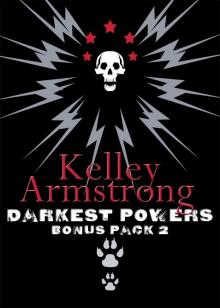 Darkest Powers Bonus Pack
Darkest Powers Bonus Pack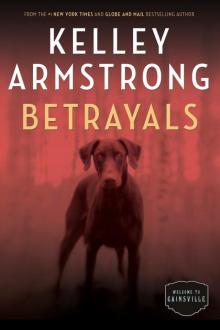 Betrayals
Betrayals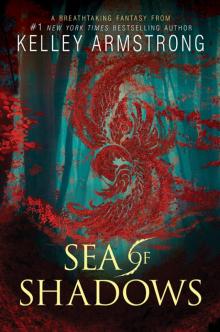 Sea of Shadows
Sea of Shadows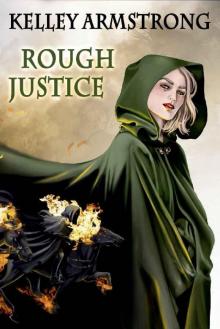 Rough Justice
Rough Justice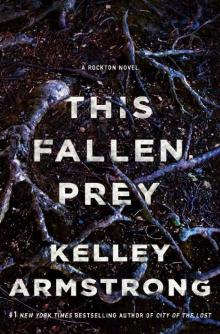 This Fallen Prey
This Fallen Prey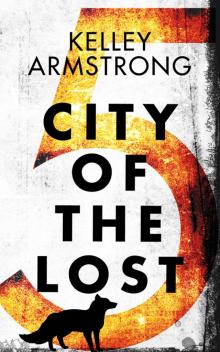 City of the Lost: Part Five
City of the Lost: Part Five Perfect Victim
Perfect Victim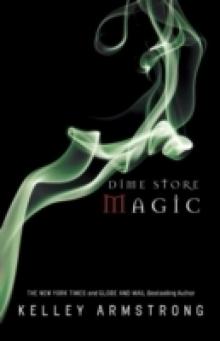 Dime Store Magic
Dime Store Magic Personal Demon
Personal Demon Haunted
Haunted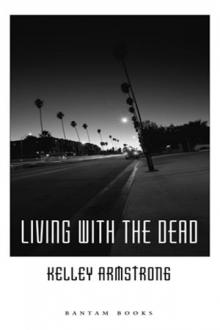 Living With the Dead
Living With the Dead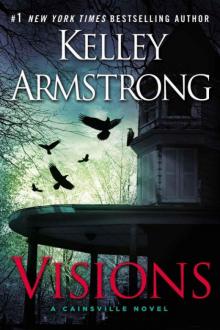 Visions
Visions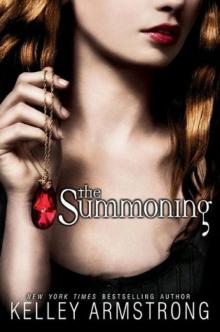 The Summoning
The Summoning Broken
Broken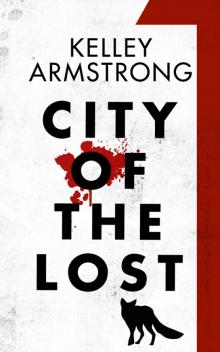 City of the Lost: Part One
City of the Lost: Part One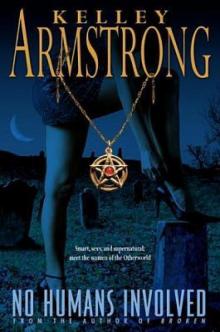 No Humans Involved
No Humans Involved The Awakening
The Awakening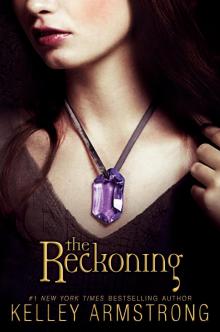 The Reckoning
The Reckoning The Gathering
The Gathering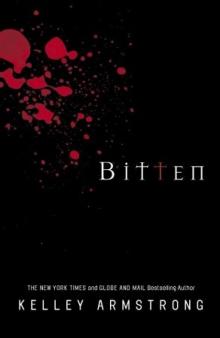 Bitten
Bitten Thirteen
Thirteen Gifted
Gifted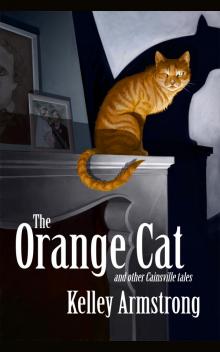 The Orange Cat and Other Cainsville Tales
The Orange Cat and Other Cainsville Tales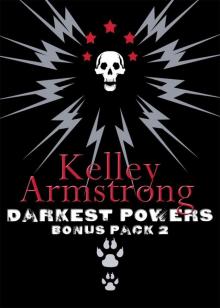 Darkest Powers Bonus Pack 2
Darkest Powers Bonus Pack 2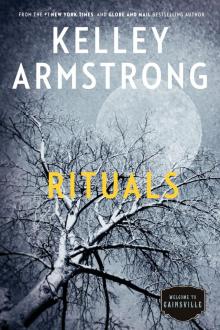 Rituals
Rituals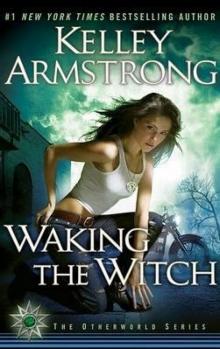 Waking the Witch
Waking the Witch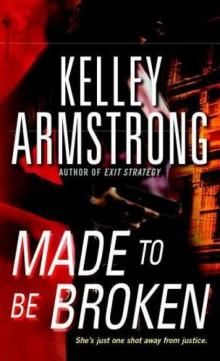 Made to Be Broken
Made to Be Broken Lost Souls
Lost Souls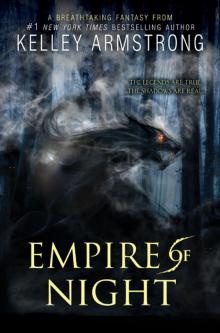 Empire of Night
Empire of Night Wild Justice
Wild Justice Double Play
Double Play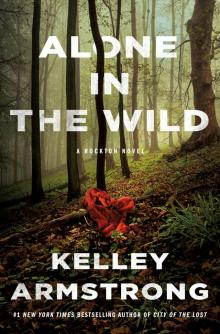 Alone in the Wild
Alone in the Wild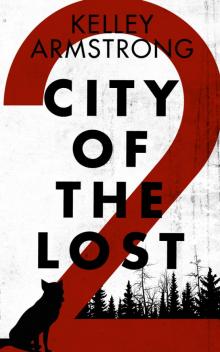 City of the Lost: Part Two
City of the Lost: Part Two A Stranger in Town
A Stranger in Town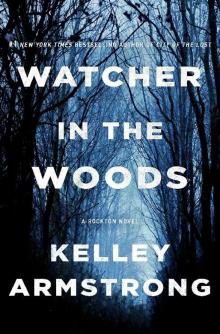 Watcher in the Woods: A Rockton Novel
Watcher in the Woods: A Rockton Novel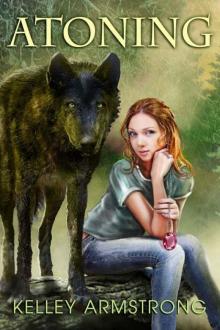 Atoning
Atoning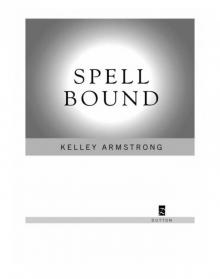 Spellbound
Spellbound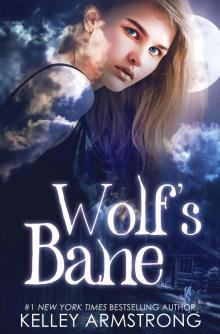 Wolf's Bane
Wolf's Bane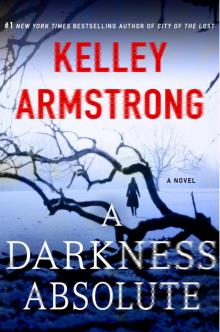 A Darkness Absolute
A Darkness Absolute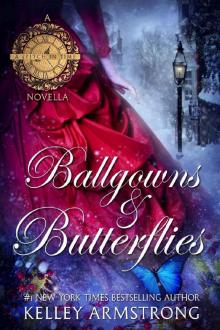 Ballgowns & Butterflies: A Stitch in Time Holiday Novella
Ballgowns & Butterflies: A Stitch in Time Holiday Novella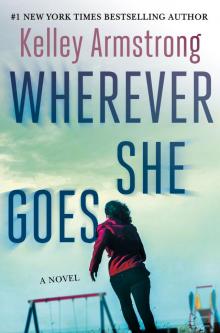 Wherever She Goes
Wherever She Goes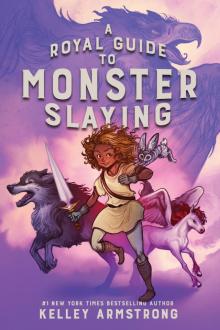 A Royal Guide to Monster Slaying
A Royal Guide to Monster Slaying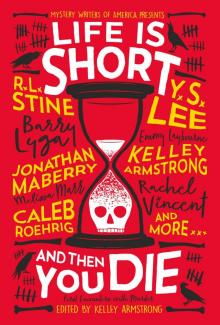 Life Is Short and Then You Die
Life Is Short and Then You Die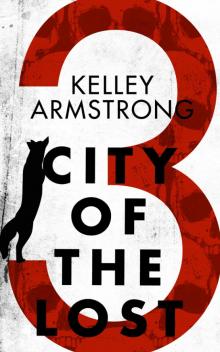 City of the Lost: Part Three
City of the Lost: Part Three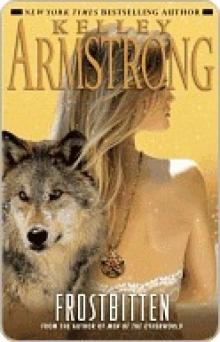 Frostbitten
Frostbitten A Stitch in Time
A Stitch in Time Industrial Magic
Industrial Magic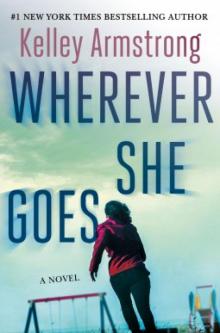 Wherever She Goes (ARC)
Wherever She Goes (ARC)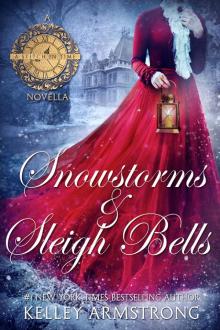 Snowstorms & Sleigh Bells: A Stitch in Time holiday novella
Snowstorms & Sleigh Bells: A Stitch in Time holiday novella Exit Strategy
Exit Strategy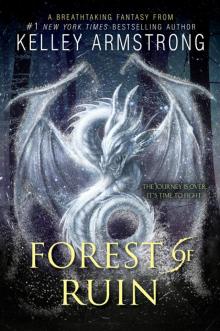 Forest of Ruin
Forest of Ruin Cursed Luck, Book 1
Cursed Luck, Book 1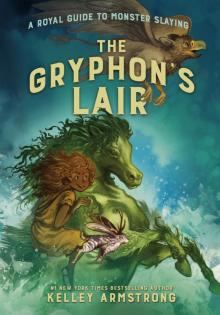 The Gryphon's Lair
The Gryphon's Lair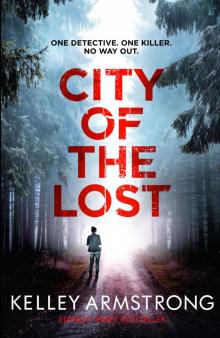 City of the Lost
City of the Lost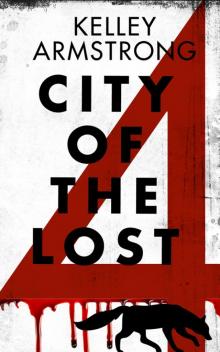 City of the Lost: Part Four
City of the Lost: Part Four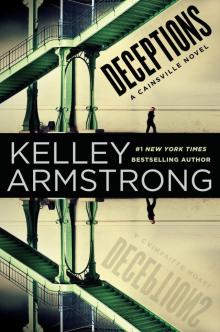 Deceptions
Deceptions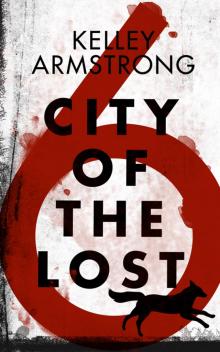 City of the Lost: Part Six
City of the Lost: Part Six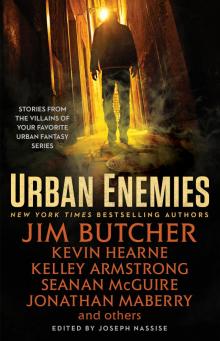 Urban Enemies
Urban Enemies Stolen
Stolen Every Step She Takes
Every Step She Takes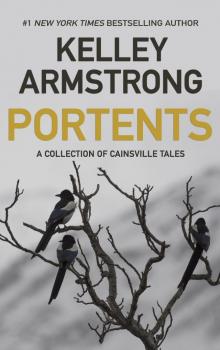 Portents
Portents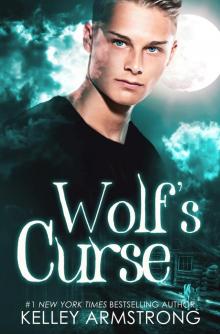 Wolf's Curse
Wolf's Curse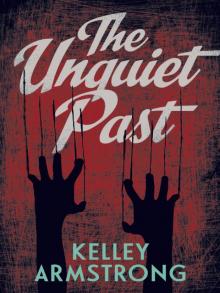 The Unquiet past
The Unquiet past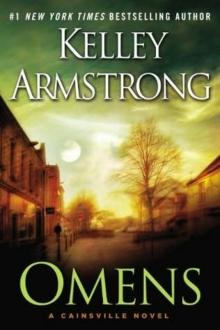 Omens ct-1
Omens ct-1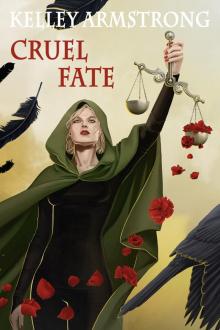 Cruel Fate
Cruel Fate The Calling dr-2
The Calling dr-2 The Awakening dp-2
The Awakening dp-2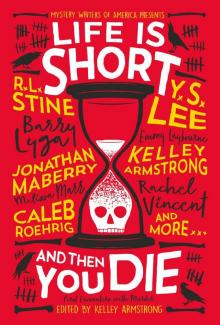 Life Is Short and Then You Die_First Encounters With Murder From Mystery Writers of America
Life Is Short and Then You Die_First Encounters With Murder From Mystery Writers of America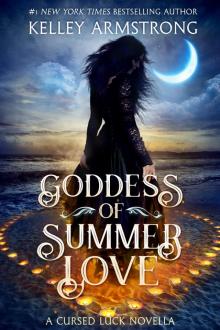 Goddess of Summer Love: a Cursed Luck novella
Goddess of Summer Love: a Cursed Luck novella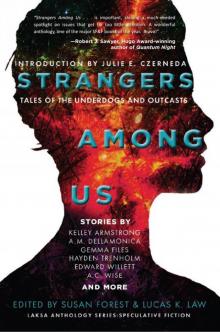 Strangers Among Us
Strangers Among Us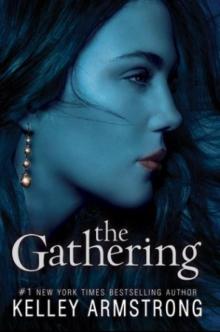 The Gathering dr-1
The Gathering dr-1 The Rising dr-3
The Rising dr-3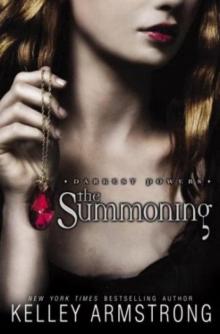 The Summoning dp-1
The Summoning dp-1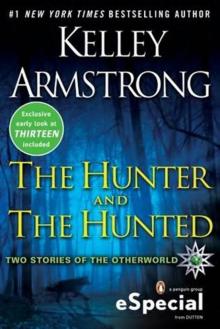 The Hunter And The Hunted
The Hunter And The Hunted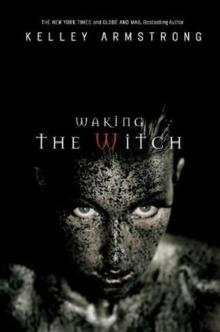 Waking the Witch woto-11
Waking the Witch woto-11